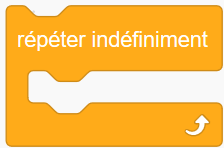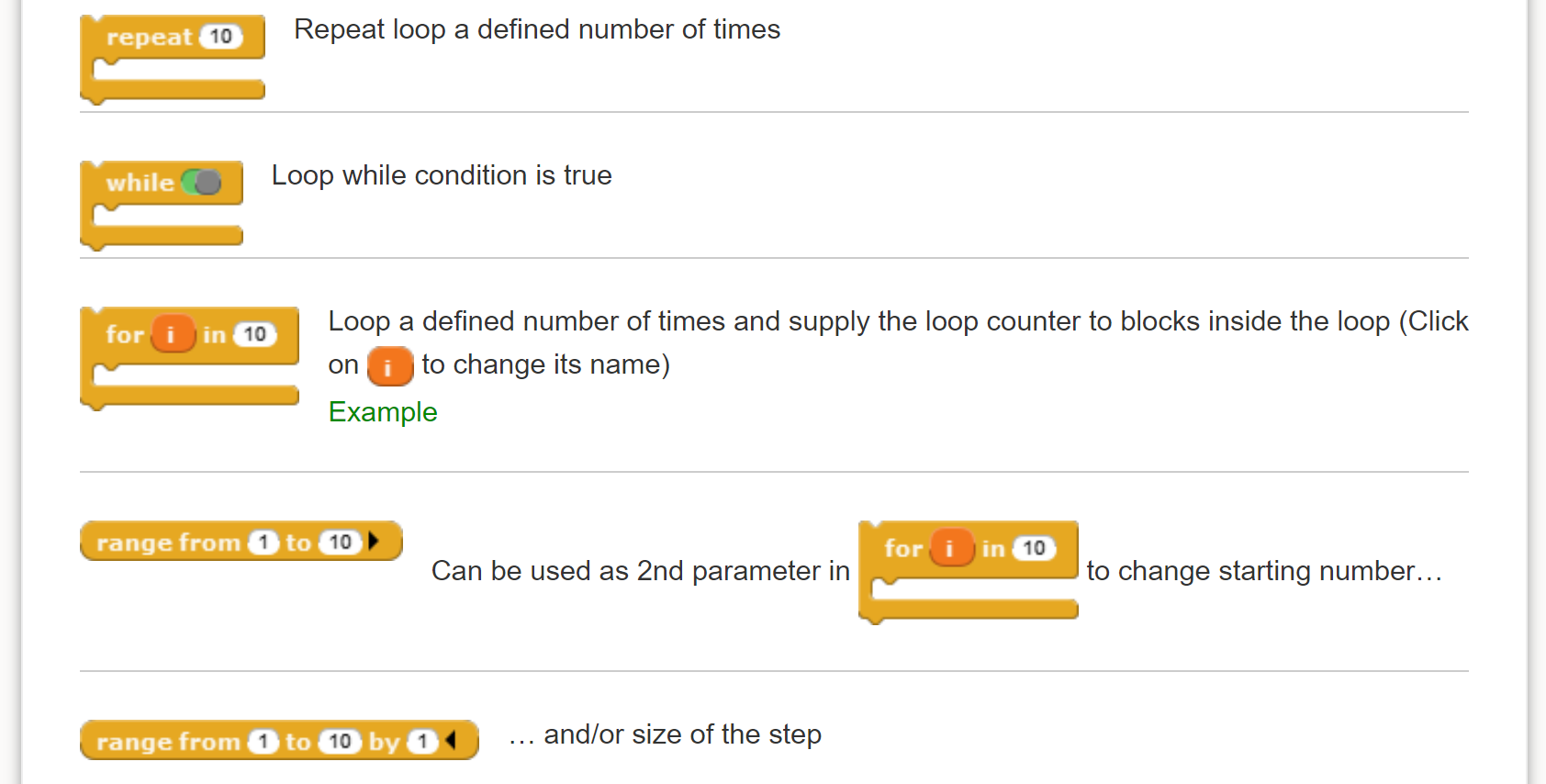Special keyword: repeat¶
Important
AvantPy includes a restriction that all statements that begin with
repeat must be on a single physical line ending with a colon that
introduces an indented block, with no other colon appearing on that line.
There is no technical reason for imposing this single-line limitation;
in fact, it does add some small complexity to AvantPy’s code.
However, by the time conditions on a repeat statement become long enough
to warrant the use of additional lines, it is likely that students are ready
to use the appropriate Python construct.
However, this single-line limitation could be removed based on feedback from instructors. Nonetheless, the requirement that no other colon is allowed on that line would remain: it might not be flagged as an error but could give rise to incorrectly converted code.
Repeating a series of instructions is something that is often done when running programs. Block-based programming environments, such as Scratch, Blockly, GP, etc, have different blocks that can be used for this purpose. For example:


and a “repeat forever” loop in French:

Depending on the block-based environment one uses, there are up to four four main such cases, which can be written as follows in standard Python:
for _ in range(n):
'''Repeat a series of instruction n times, without having to
keep track of the specific iteration number
'''
while condition:
'''Repeat a series of instruction an unspecified number of times,
while a certain condition is met.
'''
while not condition:
'''Repeat a series of instruction an unspecified number of times,
until a certain condition is met.
'''
while True:
'''Repeat a series of instruction an unspecified number of times,
until a something inside the loop triggers a "break" to end the loop.
'''
Inspired by the choices made by creators of block-based programming environments, AvantPy introduces a few additional keywords to cover the 4 cases above in a natural way:
repeat n:
# code
repeat while condition:
# code
repeat until condition:
# code
repeat forever:
# condition
Note
Learning from experts
The Quorum computing language has been designed based on evidence gathered from how human learn programming languages.
It includes three of the four repeat choices mentioned above, with a slightly different syntax:
repeat 10 times
// code
end
repeat while condition
// code
end
repeat until condition
// code
end
A concrete example¶
Suppose that I am teaching programming to beginners using Python’s turtle module. So far, we’ve only written programs that use one instruction per line:
from turtle import forward, left
# Draw a square
forward(100)
left(90)
forward(100)
left(90)
forward(100)
left(90)
forward(100)
left(90)
I wish to use this to show to students how we can have computers repeat a given set of instructions, instead of typing them multiple times. Using Python, here’s the natural way to do this:
from turtle import forward, left
# Draw a square
for variable in range(4):
forward(100)
left(90)
In doing so, I need to introduce all at once many new concepts and additional terms:
the concept of an indented code block preceded by a colon;
two keywords,
forandin;the use of a variable, which is some quantity with a completely irrelevant name in this example, except that it cannot be a keyword;
the introduction of a built-in function,
range(), which, unlikeforward()orleft(), does not have a visual representation.
By contrast, using the repeat keyword, the above can be written as:
from turtle import forward, left
# Draw a square
repeat 4:
forward(100)
left(90)
and we only need to introduce fewer new topics:
the concept of an indented code block preceded by a colon;
one new keyword:
repeat.
More gradual approach¶
As we are writing this, we note that
GP control blocks
include the following blocs which allow for a gradual
interpolation between something like repeat 10: and the
more complex and versatile Python idiom:
for i in range(1, 10, step):
# some
# code

However, we do not see the need to include this type of granularity in AvantPy.
A final word¶
We’ve already mentioned the usage in blocks-based programming environment
of repeat, or some similar alternative in other languages. repeat
was also the clearer possibility for people unfamiliar with programming jargon
as found by Andreas Stefik and Susanna Siebert, and published
“An Empirical Investigation into Programming Language Syntax.”
ACM Transactions on Computing Education, 13(4), Nov. 2013.